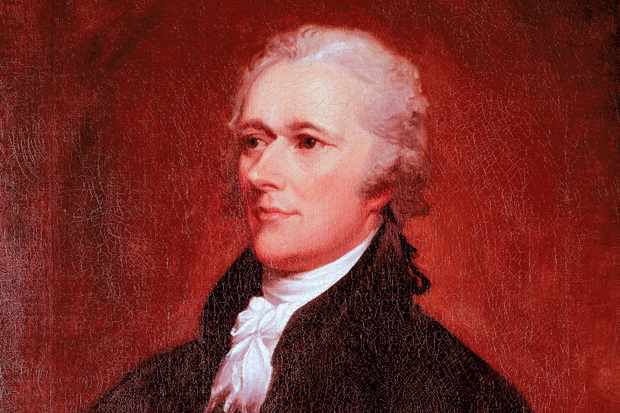Was Alexander Hamilton a Founding Father? The answer is an unequivocal “yes,” although there are aspects of his biography that set him apart. Hamilton differed from other men in the Founding generation in one regard. Unlike many of the men who led the United States in the War for Independence, Hamilton was not a native of any particular state. He was a transplant and only came into wealth when he married Elizabeth Schuyler in 1780. The Schuyler family represented the interests of elite New Yorkers. As a first-generation America, Hamilton did not have the same interests in the preservation of state authority as saying, Jefferson or John Hancock. The United States was his country, and he was one of the first Americans to display an attachment to a “nation” rather than a state.
Hamilton achieved victory over his Anti-Federalist foes with the final ratification of the Constitution in 1788. At the urging of James Madison, Washington chose Hamilton to serve as the first secretary of the Treasury under the Constitution. Madison wished the treasury to be subordinate to the Congress; Hamilton had other plans. Hamilton became the most powerful person in the federal government and Washington’s closest advisor for much of his administration.
Was Hamilton a Founding Father?
Hamilton’s financial plan involved assuming the federal debt acquired under the Articles of Confederation and the debt the states had accrued during the Revolution. Hamilton knew debt could have a tremendous impact on the government. He wrote in 1781 that “a national debt if it is not excessive, will be to us a national blessing.” The United States needed a line of credit, and a modest national debt (not the trillion-dollar variety of the modern federal government) would provide a solid financial foundation. But his plan would also tax some states twice (principally Southern states). Virginia, for example, had already retired most of its Revolutionary War debt, but Massachusetts had not. Washington brokered a compromise that allowed the assumption of state debt in return for a promise to locate the new federal capital in the South—a poor bargain, but apparently, Southerners wanted to keep an eye on the federal government.
Shortly after the “assumption scheme,” Hamilton proposed a sweeping range of financial reforms that would ultimately centralize the financial system of the United States. This involved the creation of a central bank and a series of taxes and tariffs to provide revenue for the new government. Opponents immediately challenged the constitutionality of his “Bank of the United States.” Jefferson wrote a lengthy articulation of the principles of strict construction of the Constitution in order to thwart the bank.
Hamilton never believed as many do today, that man could perfect society. “I should esteem it the extreme of imprudence to prolong the precarious state of our national affairs, and to expose the Union to the jeopardy of successive experiments, in the chimerical pursuit of a perfect plan. I never expect to see a perfect work from imperfect man. The result of the deliberations of all collective bodies must necessarily be a compound, as well of the errors and prejudices, as of the good sense and wisdom, of the individuals of whom they are composed.”
Far from being a liberal or a progressive, Hamilton, for all his belief in a strong central government, was an American conservative in the mold of a British Tory.
Cite This Article
"Was Hamilton a Founding Father?" History on the Net© 2000-2024, Salem Media.
April 26, 2024 <https://www.historyonthenet.com/was-hamilton-a-founding-father>
More Citation Information.






